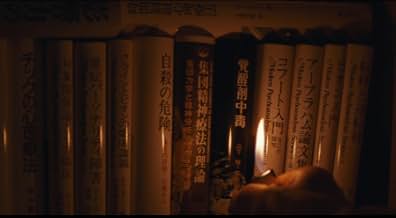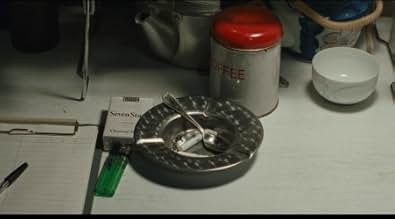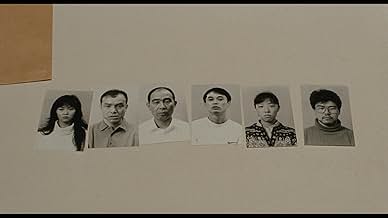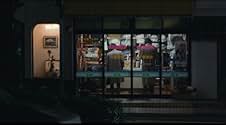Un détective frustré enquête sur plusieurs meurtres effroyables commis par des personnes qui n'ont aucun souvenir de ce qu'elles ont fait.Un détective frustré enquête sur plusieurs meurtres effroyables commis par des personnes qui n'ont aucun souvenir de ce qu'elles ont fait.Un détective frustré enquête sur plusieurs meurtres effroyables commis par des personnes qui n'ont aucun souvenir de ce qu'elles ont fait.
- Réalisation
- Scénario
- Casting principal
- Récompenses
- 9 victoires et 2 nominations au total
Avis à la une
WOW!!!! Now THAT was an EXCELLENT ending to a GREAT movie. It stuck with me for several hours after first watching it and the second time was no different. It had slow methodical pacing, but it was never boring. I, for one, appreciated the elliptical editing as it's just a filmmaker doing something different and being creative. Actually, it added to the hypnotic arc of the story. It didn't bother me whatsoever, although it wasn't nearly as effective in Kiyoshi's other great movie, "Kairo." Koji Yakusho was brilliant as troubled Detective Takabe and the mysterious drifter with hypnotic powers was very convincing as well. The use of hypnotism to get others to kill and rendering themselves soulless, was a refreshing take on the serial-killer subgenre, of which I love. Someone commented here that only people who "buy the mumbo jumbo" hypnotism storyline would like this film, and comments like those always bother me. Narrative films are not REAL LIFE, even the ones based on true stories. They are works of art, and try to tell us entertaining, comedic, frightning, and dramatic stories to keep the audience interested. I don't have to believe in the subjects their stories are telling me, nor do I believe they need to solve the world's problems. All I care is that they give me an interesting idea, an interesting story, with well-written dialogue, and if it ends with a bang. These, blended with great acting (now that's an area that needs convincing in film), great camera work, and an engaging score. Those are what make films interesting and "Kyua" aka "Cure" has all those qualities. Highly recommended.
The only time I can recall being as spooked by a film was when my parents took me to see "Hangover Square" - a gothic Jack the Ripper thriller - when I was 8 years old. I guess they couldn't find a baby-sitter. That took me about a year to get over, a low-key, all-too-realistic chiller about the banality of insanity.
"Cure" is such a perfect depiction of madness that just about every shot could be framed & hung in a gallery. You can't analyze this one, it doesn't follow a cartesian line of logic; nor does it blast you with halloweenish surprises in the style of Elm Street & its knock-offs. This has far deeper & subtler impact. I found as I relaxed into this film that images of recurring dreams & nightmares I've had since childhood arose & blended into what I was watching. Can't get much creepier than that.
That said, the images & emotions that this film evokes are on a very high level of poetic art. One of the most impressive elements of "Cure" is the director's ability to convey the magnetic manipulative appeal of Mamiya - surely one of the scariest things in real life & very difficult to convincingly convey on screen.
"Cure" is such a perfect depiction of madness that just about every shot could be framed & hung in a gallery. You can't analyze this one, it doesn't follow a cartesian line of logic; nor does it blast you with halloweenish surprises in the style of Elm Street & its knock-offs. This has far deeper & subtler impact. I found as I relaxed into this film that images of recurring dreams & nightmares I've had since childhood arose & blended into what I was watching. Can't get much creepier than that.
That said, the images & emotions that this film evokes are on a very high level of poetic art. One of the most impressive elements of "Cure" is the director's ability to convey the magnetic manipulative appeal of Mamiya - surely one of the scariest things in real life & very difficult to convincingly convey on screen.
This film is like a Japanese "mate" to Se7en, although in many ways I think it's superior. The ending is rather enigmatic but if the implications are as I see them (no spoilers) then it is the ending I wish Se7en had gone for. Like many Japanese films I've seen, I get the impression that I'm missing things (cultural outlooks, social relationships) that the Japanese must see. But even knowing that it was a very disturbing film and the director knows how to add to it. It's an extremely dark film (in many ways) and near the end it sounded like something the entire movie was "breathing", like a demon close to your ear. A very eerie effect. Worth seeing.
The serial killer movie has by now been done to death (so to speak), so it's especially rewarding to see this assured film that takes a truly ingenious approach. Kurosawa's protagonist is a seemingly dazed young man who, in spite of his aimless demeanor, is a master hypnotist. To reveal any more of what happens would be to give a bit too much away.
The subtlety and fluidity of this film is remarkable. The main character can be charming and simultaneously irritating when he speaks. He turns his speaking partner's question back on the speaker; he answers with vague phrases that nevertheless, over the course of the film, gradually bring out the complexity of his psyche. Pitting him against a cop whose wife seems to suffer from something like the hypnotist's 'brand' of mental wanderings underlines the thematic context of the film: what we know is almost certainly only what we think we know. And what we think we know is almost certainly based on someone else's 'knowledge', derived the same as ours.
That knowledge is a collective phenomenon, a shared and critical feature of the 'hive' is not a novel concept in film. But its presentation here is bold and original. To link that idea with a person who destroys life is a master stroke; it says that what we know vanishes in a suddenly extinguished flame, or a tiny stream of water that appears, runs, and then is seen no more.
This is a film that should definitely be added to the great films of the 90s. Since it was not released in the U.S. until 2001, I vote for it being one of the great films of that year here.
The subtlety and fluidity of this film is remarkable. The main character can be charming and simultaneously irritating when he speaks. He turns his speaking partner's question back on the speaker; he answers with vague phrases that nevertheless, over the course of the film, gradually bring out the complexity of his psyche. Pitting him against a cop whose wife seems to suffer from something like the hypnotist's 'brand' of mental wanderings underlines the thematic context of the film: what we know is almost certainly only what we think we know. And what we think we know is almost certainly based on someone else's 'knowledge', derived the same as ours.
That knowledge is a collective phenomenon, a shared and critical feature of the 'hive' is not a novel concept in film. But its presentation here is bold and original. To link that idea with a person who destroys life is a master stroke; it says that what we know vanishes in a suddenly extinguished flame, or a tiny stream of water that appears, runs, and then is seen no more.
This is a film that should definitely be added to the great films of the 90s. Since it was not released in the U.S. until 2001, I vote for it being one of the great films of that year here.
This movie has a simple premise and a simple story that is nevertheless explored in an incredibly delicate and talented way. Kiyoshi Kurosawa is an extremely talented individual and perhaps the only writer/director who is able to simultaneously scare and mentally challenge me at the same time (note that very few are capable of doing one or the other). Although the writing is very good (story and dialogue), Kurosawa's real strength is his ability to represent visually the progressive denouement of his story. He rather subtly show you and let your imagination and intellect figure it out for you than to spell out bluntly what the straightforward storyline should be. It does not, however, get to the point of chaotic untidiness or pointlessness, for he is able to guide you slowly along the way (I would then say that he is slightly easier to follow than David Lynch is, but then again who is not). He uses here a strikingly effective technique where he shows you a room from one angle and later lets you discover that room more and more as the movie advances. His camera shots are always well planned and he is thus able to draw you in the movie bit by bit-quite an eerie sensation.
The acting is generally good and believable. The camera-work is a stand out.
There are many scenes where you will be able to appreciate this superior artistic and technical quality. The music is good and tenseful, but it is sparse and what is used instead is a contrast of minimalist and grossly amplified everyday sounds that vibrate through the movie. When there is no sound, you often find yourself holding your breath. This is not used strictly as a ploy, but rather creates a mood and further pulls you in the general atmosphere of the movie. Most of all, again, the directing is top notch. The pace which is slow enough for you to have the time to both think and be afraid is not slow enough that it gets boring, although you should not expect a North American expeditious run through the film. Everything is there, but it comes to you in slow, meticulously chosen dosage. Only, at the end can you truly see the masterpiece that has been drawn stroke by stroke in front of you.
One of the reason this movie actually works is that it is designed to play with your mind and trigger fear and reaction based not only on emotion, but on reason. People are dying, but everything is calm, rational. The tone and story are pretty much realistic and, at the end of the experience, you may feel beyond your volitional control that you are actually convinced of the "strange" things in the movie. Hopefully this feeling will subside...
The acting is generally good and believable. The camera-work is a stand out.
There are many scenes where you will be able to appreciate this superior artistic and technical quality. The music is good and tenseful, but it is sparse and what is used instead is a contrast of minimalist and grossly amplified everyday sounds that vibrate through the movie. When there is no sound, you often find yourself holding your breath. This is not used strictly as a ploy, but rather creates a mood and further pulls you in the general atmosphere of the movie. Most of all, again, the directing is top notch. The pace which is slow enough for you to have the time to both think and be afraid is not slow enough that it gets boring, although you should not expect a North American expeditious run through the film. Everything is there, but it comes to you in slow, meticulously chosen dosage. Only, at the end can you truly see the masterpiece that has been drawn stroke by stroke in front of you.
One of the reason this movie actually works is that it is designed to play with your mind and trigger fear and reaction based not only on emotion, but on reason. People are dying, but everything is calm, rational. The tone and story are pretty much realistic and, at the end of the experience, you may feel beyond your volitional control that you are actually convinced of the "strange" things in the movie. Hopefully this feeling will subside...
Le saviez-vous
- Gaffes(at around 51 mins) In Japan, they drive on the left side of the road and the steering wheel is on the right side of the car. In every scene in this picture that's the case - except one. When the detective leaves in his car to go to the hospital because Mamiya has turned up there, the steering wheel is on the left and he drives on the right side of the road.
- Citations
Kunio Mamiya: All the things that used to be inside of me... now they are all outside.
- Crédits fousThere are no opening credits, with the exception of the movie's title.
- ConnexionsEdited into Cure: or How to Be Happy While Saving the Species (2017)
Meilleurs choix
Connectez-vous pour évaluer et suivre la liste de favoris afin de recevoir des recommandations personnalisées
- How long is Cure?Alimenté par Alexa
Détails
Box-office
- Budget
- 1 000 000 JPY (estimé)
- Montant brut mondial
- 232 829 $US
- Durée
- 1h 51min(111 min)
- Couleur
- Mixage
- Rapport de forme
- 1.85 : 1
Contribuer à cette page
Suggérer une modification ou ajouter du contenu manquant

![A mesmerising and hypnotic psychological thriller from Kiyoshi Kurosawa...
Released to critical acclaim in both the East and the West, CURE was a breakthrough film for director Kiyoshi Kurosawa, a nerve shredding thriller about the hunt for a serial killer in a bleak and decaying Tokyo.
A series of murders have been committed by ordinary people who claim to have had no control over their horrifying actions. Following the only link - a mysterious stranger who had brief contact with each perpetrator and their victim - detective Kenichi Takabe (Kôji Yakusho, 13 ASSASSINS, TOKYO SONATA) places his own sanity on the line as he tries to end the wave of inexplicable terror.
Described as one of the greatest films of all time by Bong Joon-ho (THE HOST, SNOWPIERCER), CURE is a deeply unsettling masterpiece of its genre, and has shockingly been unavailable on home video in the UK until now. The Masters of Cinema Series is proud to present Cure in a special Dual Format edition.
CURE [Kyua], Kiyoshi Kurosawa's mesmerising and hypnotic psychological thriller, is released on home video for the first time in the UK as part of The Masters of Cinemas Series in a Dual Format edition on 23 April 2018.](https://m.media-amazon.com/images/M/MV5BZjdlYmU3YTktZTQzNi00YWE5LTgzZjQtYmI3OTRkNTQyYTkxXkEyXkFqcGdeQXVyMTg2NTc4MzA@._V1_QL75_UX500_CR0)






























